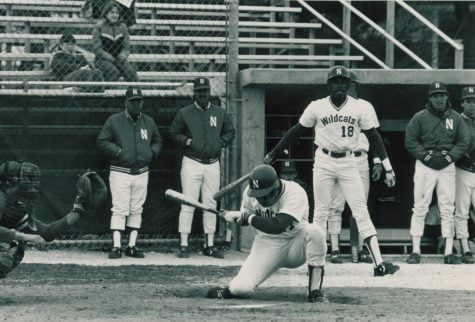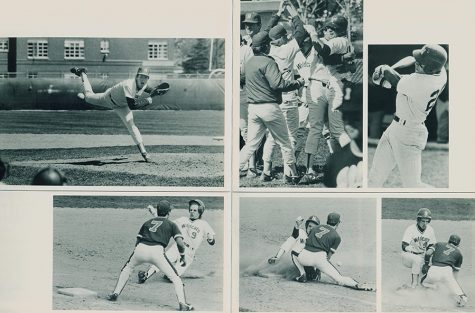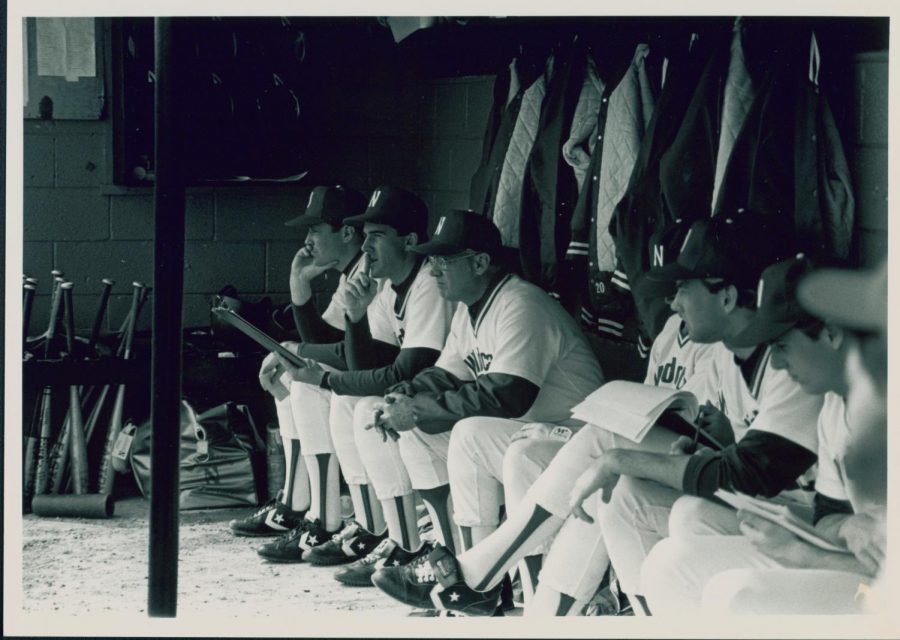Baseball: Revisiting the unprecedented success of the Ron Wellman coaching era
May 9, 2018
The story of the Ron Wellman era of Northwestern baseball, of the five years in a century and a half of history when the program didn’t just scrape by in the Big Ten basement but rather clawed for unprecedented heights and came painfully close to achieving them, began and ended with a storm.
It started — not literally, but realistically — in the basement of McGaw Hall, now Welsh-Ryan Arena, on a blizzard-ravaged night in the winter of 1982.
It finished on the soggy field of Miller Park after two emotional losses to Illinois in May 1986, just before a downpour swept away the successes of that half-decade as quickly as they had come.
But between, the story is one of sweat and sunshine, of a coach who knew his players could do more and the players who proved him right, of pushing past great disappointments, and of carving out the most unlikely of success stories at a university that has seen decades upon decades of bad baseball both before and after.
The beginning
The weather forecast was growing increasingly ominous for the upcoming weekend when Wellman, then a young coach fresh out of his first gig at local Elmhurst College, gave his newly inherited players unusual instructions for their Friday night practice: bring a pillow.
“It was going to be a blizzard and it was going to be very difficult to get them back safely on Saturday morning,” Wellman said. “I just notified the players that we’ll have a camp-out in the locker room so we’re certain to have everyone be able to make the practice. I actually slept in the coaches’ locker room, so nobody went home.”
Wellman had shown up just the fall before and implemented a twice-a-day practice routine, which stunned a team accustomed to the lackadaisical schedule that previous 20-year skipper George McKinnon had followed.
The 180-degree turn in styles was a shock to the team’s system, Eric Mogentale (McCormick ’84) recalled. Many players quit; only three out of McKinnon’s entire 1980 recruiting class lasted all four years on the team. But a few embraced the on-the-field rewards they knew the hard work would bring.
“(McKinnon) used to say often, ‘College baseball is the last fun Division I sport left,’ that basketball and football had become businesses,” Mogentale said. “George didn’t realize that not winning isn’t that fun.”
Wellman, for one, knew how to win. He’d won 210 games and lost just 134 in 10 years at Elmhurst; NU, meanwhile, had gone 17-33 the previous season alone.
He also knew how to find others who were willing to commit everything to winning.
One time, he drove to Springfield, watched a high school playoff game and stood in line for an hour afterward behind six other interested college coaches to talk to one catcher. He was, of course, unaware that player would go on to bat in the majors for 15 years and manage for another 11.
That man’s name was Joe Girardi (McCormick ’86).
“I was probably going to go play at the University of New Orleans … and Ron saw me play one game and asked me, ‘Please don’t sign until I have a chance to meet with you,’” Girardi said. “When Ron Wellman made his offer, my mom’s eyes lit up … and I knew that was the place for me.”
Girardi would become the backbone of the team from 1983 to 1986, earning first team All-Big Ten honors both of his upperclassman years and serving as the team’s leader. But Wellman used his “presence, professionalism and intensity,” as described by pitcher Tony Ariola (SESP ’88), to surround Girardi with plenty of more talent.
Headlining the class of 1985, Wellman’s first recruiting class, were the likes of Dan Grunhard (batted .451 with 53 RBIs in 1984), Mike Huff (went on to a seven-year MLB career) and Tom Hildebrand (batted .389 with 58 RBIs in 1985). Stars of the class of 1986, in addition to Girardi, included John Stewart (the Cats’ versatile one-size-fits-all outfielder), Ed Tompa (a three-year starter at first base), Al Quintana (batted .342 in 1986) and pitcher Grady Hall (11-1 with a 2.31 ERA in 1986).
Wellman also pressured the University to improve the dilapidated Miller Park. Previously, the dugout was not dug but definitely out — it was a plywood shack that blew over once during a game in McKinnon’s final season, Magentale said. Wellman made sure that was fixed, and that a new scoreboard was added as well.

A Northwestern hitter swings as Reggie Hammonds looks on in the on-deck circle.
The middle
As Wellman’s intensity became the norm, success slowly followed. The Cats went 25-27-1 in his first season, marking still a massive improvement over the prior campaign. They took another step forward to 32-20-2 in his second season, but won just six of 15 Big Ten games.
Entering the 1984 season, the time had come for NU to break through, and Wellman was determined to get the team ready for it.
“I thought going into Northwestern I was an intense baseball player, and I was wrong,” Ariola said. “Ron had a whole new definition of intensity for me. And through this hard work, he really taught us how to remove some of the self-imposed limitations that we put on ourselves.”
An annual favorite was the track run, when Wellman made the entire team run three miles in a specific maximum length of time.
The players have apparently since forgotten how many minutes it was — Ariola estimated 20, reliever Chris Nichting (Weinberg ’88) said 24 — but the memories of its effects on their psyche remain in vivid color.
“I didn’t know it was humanly possible for me to run three miles in under 20 minutes, but he made me,” Ariola said. “You just learned how to push yourself (beyond) what maybe before you didn’t think was possible, and that transferred over to when I was on the mound. In the fifth or sixth inning, I would have this confidence that I was not tired and could do this for another 21 innings.”
After taking two of three games in a Spring Break series at No. 4-ranked North Carolina, the Cats surged into the national conversation. They eventually rolled to a sparkling 44-18-1 record, setting the program’s all-time wins record that hasn’t even been threatened since, and tallied a 9-6-1 mark in the conference that was enough to qualify for the then-four-team Big Ten Tournament (it has since expanded to eight teams).
After a loss to a dynastic Michigan team in the opening round of the double-elimination tournament, NU knocked off Michigan State and Minnesota to earn a final-day rematch against the Wolverines, needing to win twice to take the conference title. They won just once: After a 6-2 Cats victory in the first game, Michigan prevailed 8-3 in the deciding second game to claim the Big Ten’s one automatic NCAA Tournament bid.
The team expected to receive an at-large bid — Wellman told The Daily’s beat reporter at the time that “if we don’t make the regionals, someone should investigate the NCAA” — but they were snubbed. It remains the closest the program has come since 1957 to making the tournament.
By the following spring, NU had finally reached the plateau that Wellman had sought for years. It was ranked 21st in Baseball America’s national rankings at the start of April and the coach said at the time that he “didn’t really annihilate this team” like those of years past.
“By ’85, and really probably the last (part) of ’84, I didn’t have to play that role anymore,” Wellman said. “They were challenging each other and the leadership came from within the team, rather than from me.”
The 1985 team went 40-18 overall but inexplicably stumbled to a losing record in conference play and missed out on the tournament. Then, early the following year, Wellman stunned the squad with news: After the season’s conclusion, he would be leaving Evanston to become the athletic director at Minnesota State-Mankato.
Wellman’s upcoming departure and Girardi’s inevitable graduation set up the 1986 season as the culmination of a relatively brief but nonetheless instantly legendary era. There was no time, however, for a grand parade — the team, despite its exponential winning percentage, had yet to bring home a trophy to Evanston.
And at last, all the pieces were in place to break that postseason hex.
“At that time, people were saying, ‘Who is this purple and white team out of Chicago and are they really that sound at playing the game?’” Nichting said. “I really think we were. I think we could’ve gone very far.”

Baseball team photos from the 1985 Syllabus Yearbook.
The end
As Illinois’ game-tying hit bounced down the left field line, simultaneously trampling blades of grass and the lofty goals that Wellman had brought to and nearly achieved at NU, Nichting looked toward the dugout — the dugout Wellman had basically built himself five years prior — looking for something, anything, to save him.
He said he saw two seniors, Girardi and Hall, standing on the top step. He saw the face of Wellman himself farther within. He found no solace.
“They didn’t look like they’d lost something very close to them, but it looked like something had come out of the sails,” said Nichting, who had entered the game with a nearly unhittable 0.79 ERA. “I felt like I’d let down all that those guys had done for Northwestern baseball with that one hit.”
All that they’d done was a list short on trophies but long on victories: 155 wins and just 70 losses over four straight dominant seasons, but not a single Big Ten championship or NCAA Tournament appearance.
A win that spring Sunday — one which began with anticipation and ended with dismay and flipped from one to the other when visiting Illinois tagged Nichting for four game-tying runs in the 7th inning and later handed him the loss in the 12th — could have changed the latter part. After winning both ends of a Saturday doubleheader against the Fighting Illini, NU entered the day 39-12 overall, 9-5 in the conference, and just one win away from clinching a tournament bid.
Instead, a pair of losses agonizingly ended NU’s 1986 season and the five-year Wellman era, an era in which the program was resurrected in glorious but ever-so-fleeting fashion.
Girardi had broken his ankle the day before and wasn’t able to catch, but still served as a designated hitter; “I was going to do whatever it took,” he said. In the nightcap of the doubleheader, the emotionally exhausted Cats were blown out, 11-1, in what officially became Wellman’s last game at the school.
Nichting — then a sophomore, today going on 52 — now knows it wasn’t all his fault. Success is a matter of three things, he said: preparation, knowledge and timing. Those Cats had a surfeit of the first two, with a handful of future major-leaguers and a coach notorious for his intense practices. They spent half a decade clawing desperately, painstakingly, for the third, but never quite reached it.
“Some days, that’s baseball,” Ariola said. “Sometimes the game is cruel.”
The legacy
Girardi went on to play 1,277 games for the Chicago Cubs, Colorado Rockies, New York Yankees and St. Louis Cardinals, then manage 1,782 more for the Yankees and Miami Marlins. He’s now an analyst for MLB Network.
And yet when he reflects upon his favorite moment in the whole journey, his mind pulls him back a little further, back a few years and a few miles up the Lake Michigan shoreline, to Evanston.
“I look back at all the experiences I’ve had in baseball, and I can’t say there was anything more enjoyable to me than my college baseball at Northwestern,” Girardi said. “We grew up together. We came in as teenagers and Ron Wellman made us men.”
Wellman has since helped many, many thousands of college athletes follow similar journeys. He’s served as Wake Forest’s athletic director for the past 26 years, making him the longest-tenured AD at any major-conference university in the country.
His former players, though, remember him not for his great contributions as an athletic director but for his strict but passionate coaching, for his aura of earnesty and relentlessness, for his unprecedented legacy of success at NU and for his tremendous impact on each of their lives.
“We were a team that didn’t back down, and in our history, we did back down. You have to attribute that change to a person, and that person is Ron Wellman,” Mogentale said. “That guy singlehandedly changed the program, and he changed my life, too. If you’re a young person and you see someone come in and … change everything and then you start to win together, that changes your perspective. You want yourself to become that agent of change in life.”
Email: [email protected]
Twitter: @benpope111

